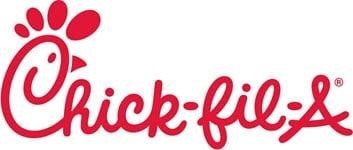

Nutrition facts and Weight Watchers points for Milk from Chick-fil-A.
Calories
There are 90 calories in Milk.
Nutrition Facts
| Serving Size | 7 fl oz | |
| Calories | 90 | |
| Calories From Fat | 18 | |
| Amount Per Serving | % Daily Value* | |
| Total Fat | 2g | 3% |
| Saturated Fat | 1.5g | 8% |
| Trans Fat | 0.0g | |
| Cholesterol | 10mg | 3% |
| Sodium | 105mg | 4% |
| Total Carbohydrates | 10g | 3% |
| Dietary Fiber | 0g | 0% |
| Sugars | 10g | |
| Protein | 7g | 14% |
| Vitamin A | ? | |
| Vitamin C | ? | |
| Calcium | ? | |
| Iron | ? | |
*All percent daily value figures are based on a 2,000 calorie diet.
Nutritional information source: Chick-fil-A
Allergens
Contains milk
Does Not Contain* egg fish gluten peanuts shellfish soy tree nuts wheat
Unknown glutamates MSG mustard nitrates seeds sesame sulfites
Allergy Information: a Chick-fil-A Milk contains milk. a Chick-fil-A Milk does not contain egg, fish, gluten, peanuts, shellfish, soy, tree nuts or wheat.*
* Please keep in mind that most fast food restaurants cannot guarantee that any product is free of allergens as they use shared equipment for prepping foods.
Ingredients
Lowfat milk Vitamin A Palmitate and Vitamin D3.
Additional Information
Chick-fil-A is known for its delicious and satisfying menu offerings, and one item that often goes unnoticed is its milk. While it may seem like a simple beverage choice, Chick-fil-A milk offers a number of features and benefits that make it a noteworthy option for those looking for a refreshing and nutritious beverage. In this article, we will explore the features, benefits, and potential drawbacks of Chick-fil-A Milk.
Features & Benefits
Chick-fil-A Milk is a low-fat beverage made with high-quality ingredients. It is served in a 7-fl oz. serving, providing a convenient and manageable portion size. The milk is sourced from trusted suppliers and is free of common allergens such as eggs, fish, gluten, peanuts, shellfish, soy, tree nuts and wheat, making it suitable for those with specific dietary restrictions or allergies. Chick-fil-A Milk ingredients include low-fat milk, vitamin A palmitate and vitamin D3.
Benefits:
- Nutritional Value: Chick-fil-A Milk is a good source of essential nutrients. It contains 90 calories per serving, making it a relatively low-calorie beverage option. It provides 7 grams of protein, which is essential for muscle growth and repair. It also provides 10g of carbohydrates, which provide the body with energy for daily activities. Milk is also a good source of calcium, which helps build and maintain strong bones and teeth.
- Versatility: Chick-fil-A milk can be enjoyed on its own or paired with other menu items. Whether you’re enjoying a classic Chick-fil-A sandwich or a delicious salad, the milk can complement your meal and provide a satisfying beverage choice. It is a versatile option that can be enjoyed by people of all ages.
- Allergen Information: The Chick-fil-A website states that the milk used in their products does not contain common allergens. While it’s important to note that cross-contamination can occur in a fast food environment, Chick-fil-A takes precautions to minimize the risk. However, if you have a severe allergy, it’s always best to exercise caution and contact the restaurant directly.
Disadvantages:
- Limited variety: While Chick-fil-A milk is a great option for those who enjoy traditional dairy milk, it may not appeal to individuals who prefer non-dairy alternatives. If you’re looking for plant-based or lactose-free options, Chick-fil-A does not currently offer milk substitutes such as almond milk, soy milk, or oat milk. However, they do offer non-dairy coffee creamer.
- Calories: While Chick-fil-A milk is relatively low in calories, it’s important to consider your overall nutritional goals and needs. If you’re watching your calorie intake or following a specific diet plan, it’s important to factor the calories from milk into your daily consumption. Additionally, individuals with special dietary needs or restrictions, such as those following a ketogenic or low-carb diet, may need to consider the carbohydrate content of milk.
Conclusion
Chick-fil-A Milk is a nutritious and refreshing beverage option available at Chick-fil-A restaurants. It offers several benefits, including its nutritional value, versatility, and allergen information. However, it’s important to note the limited variety of milk options and consider the caloric content based on your individual dietary needs. Whether you’re enjoying a meal at Chick-fil-A or looking for a stand-alone beverage, Chick-fil-A milk is a worthy choice for those seeking a healthy and satisfying beverage.
Questions and Answers
Is Chick-fil-A milk safe for people with allergies?
Yes, Chick-fil-A Milk does not contain common allergens such as eggs, fish, gluten, peanuts, shellfish, soybeans, tree nuts or wheat. However, it’s important to note that cross-contamination can occur in the fast food environment, so individuals with severe allergies should exercise caution and consult with the restaurant directly.
Does Chick-fil-A offer non-dairy milk options?
No, Chick-fil-A does not currently offer non-dairy milk options such as almond milk, soy milk or oat milk. However, they do offer non-dairy coffee creamer.
How many calories are in Chick-fil-A milk?
Chick-fil-A Milk contains 90 calories per serving, which is equivalent to a 7-fl oz. portion.
What are the nutritional benefits of Chick-fil-A Milk?
Chick-fil-A Milk provides 7 grams of protein, which is beneficial for muscle growth and repair. It is also a good source of calcium, which helps build and maintain strong bones and teeth. It also provides 10 grams of carbohydrates, which provide energy for daily activities.
Can Chick-fil-A Milk be enjoyed with other menu items?
Yes, Chick-fil-A milk can be enjoyed on its own or paired with other menu items. Whether you’re enjoying a classic Chick-fil-A sandwich or a delicious salad, the milk can complement your meal and provide a satisfying beverage choice.